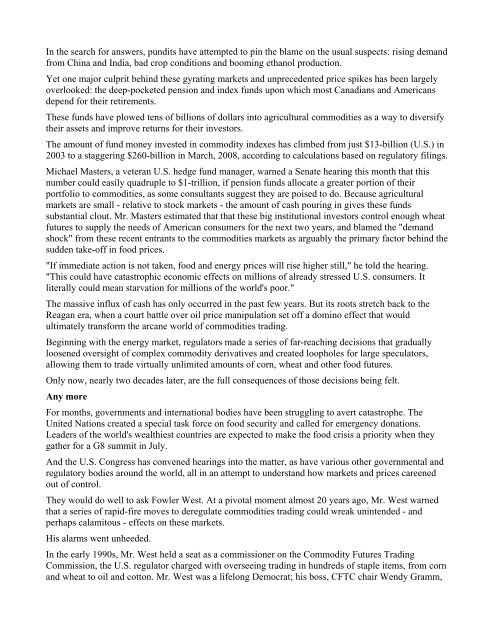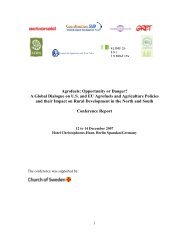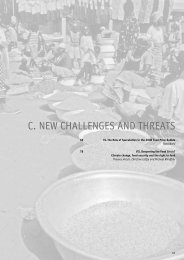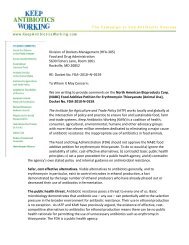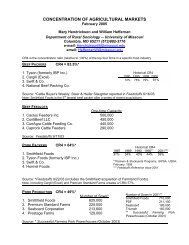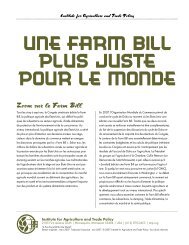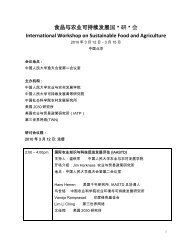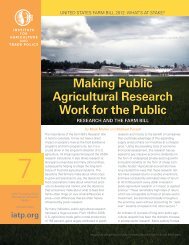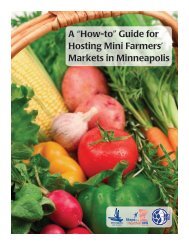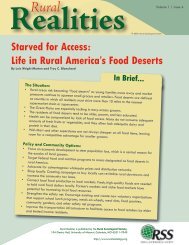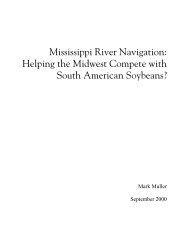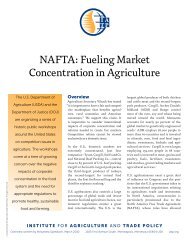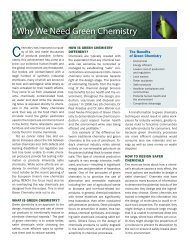Download this document - Institute for Agriculture and Trade Policy
Download this document - Institute for Agriculture and Trade Policy
Download this document - Institute for Agriculture and Trade Policy
You also want an ePaper? Increase the reach of your titles
YUMPU automatically turns print PDFs into web optimized ePapers that Google loves.
In the search <strong>for</strong> answers, pundits have attempted to pin the blame on the usual suspects: rising dem<strong>and</strong><br />
from China <strong>and</strong> India, bad crop conditions <strong>and</strong> booming ethanol production.<br />
Yet one major culprit behind these gyrating markets <strong>and</strong> unprecedented price spikes has been largely<br />
overlooked: the deep-pocketed pension <strong>and</strong> index funds upon which most Canadians <strong>and</strong> Americans<br />
depend <strong>for</strong> their retirements.<br />
These funds have plowed tens of billions of dollars into agricultural commodities as a way to diversify<br />
their assets <strong>and</strong> improve returns <strong>for</strong> their investors.<br />
The amount of fund money invested in commodity indexes has climbed from just $13-billion (U.S.) in<br />
2003 to a staggering $260-billion in March, 2008, according to calculations based on regulatory filings.<br />
Michael Masters, a veteran U.S. hedge fund manager, warned a Senate hearing <strong>this</strong> month that <strong>this</strong><br />
number could easily quadruple to $1-trillion, if pension funds allocate a greater portion of their<br />
portfolio to commodities, as some consultants suggest they are poised to do. Because agricultural<br />
markets are small - relative to stock markets - the amount of cash pouring in gives these funds<br />
substantial clout. Mr. Masters estimated that that these big institutional investors control enough wheat<br />
futures to supply the needs of American consumers <strong>for</strong> the next two years, <strong>and</strong> blamed the "dem<strong>and</strong><br />
shock" from these recent entrants to the commodities markets as arguably the primary factor behind the<br />
sudden take-off in food prices.<br />
"If immediate action is not taken, food <strong>and</strong> energy prices will rise higher still," he told the hearing.<br />
"This could have catastrophic economic effects on millions of already stressed U.S. consumers. It<br />
literally could mean starvation <strong>for</strong> millions of the world's poor."<br />
The massive influx of cash has only occurred in the past few years. But its roots stretch back to the<br />
Reagan era, when a court battle over oil price manipulation set off a domino effect that would<br />
ultimately trans<strong>for</strong>m the arcane world of commodities trading.<br />
Beginning with the energy market, regulators made a series of far-reaching decisions that gradually<br />
loosened oversight of complex commodity derivatives <strong>and</strong> created loopholes <strong>for</strong> large speculators,<br />
allowing them to trade virtually unlimited amounts of corn, wheat <strong>and</strong> other food futures.<br />
Only now, nearly two decades later, are the full consequences of those decisions being felt.<br />
Any more<br />
For months, governments <strong>and</strong> international bodies have been struggling to avert catastrophe. The<br />
United Nations created a special task <strong>for</strong>ce on food security <strong>and</strong> called <strong>for</strong> emergency donations.<br />
Leaders of the world's wealthiest countries are expected to make the food crisis a priority when they<br />
gather <strong>for</strong> a G8 summit in July.<br />
And the U.S. Congress has convened hearings into the matter, as have various other governmental <strong>and</strong><br />
regulatory bodies around the world, all in an attempt to underst<strong>and</strong> how markets <strong>and</strong> prices careened<br />
out of control.<br />
They would do well to ask Fowler West. At a pivotal moment almost 20 years ago, Mr. West warned<br />
that a series of rapid-fire moves to deregulate commodities trading could wreak unintended - <strong>and</strong><br />
perhaps calamitous - effects on these markets.<br />
His alarms went unheeded.<br />
In the early 1990s, Mr. West held a seat as a commissioner on the Commodity Futures Trading<br />
Commission, the U.S. regulator charged with overseeing trading in hundreds of staple items, from corn<br />
<strong>and</strong> wheat to oil <strong>and</strong> cotton. Mr. West was a lifelong Democrat; his boss, CFTC chair Wendy Gramm,


